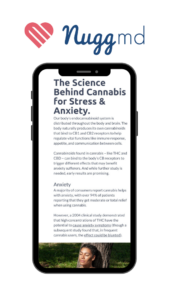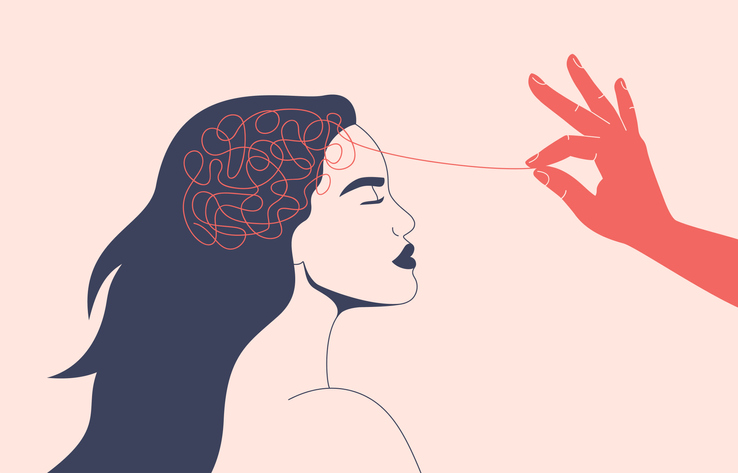It’s no secret that many people turn to cannabis for relief from anxiety. According to the ADAA, anxiety disorders are the most common mental disorder in the United States. It affects more than 40 million adults per year.
The most common conventional treatment for anxiety comes from a class of pharmaceutical drugs called benzodiazepines. According to the National Institute of Health, about 30.5 million adults in the U.S. use benzodiazepines, or about 12.5% of the U.S. adult population.
Xanax (alprazolam) is one of the most common benzodiazepines. It’s often prescribed to treat generalized anxiety disorder (GAD) and other anxiety disorders, like panic disorder and agoraphobia.
But with more and more people turning to cannabis to treat anxiety, it’s led them to wonder, “Is cannabis safe to use while taking Xanax?”

Find natural, lasting relief with our comprehensive (and completely free) patient’s guide to medical cannabis for stress and anxiety.
What Is Xanax?
Xanax is the brand name of alprazolam, a benzodiazepine commonly prescribed to treat anxiety disorders. Like other benzodiazepines, Xanax works by boosting signals from the GABA neurotransmitter to send calming messages to the brain.
Despite how commonly Xanax is prescribed, it has a relatively extensive list of possible – albeit uncommon – side effects.
- Headaches
- Dizziness
- Drowsiness
- Tiredness
- Light-headedness
- Irritability
- Being overly-talkative
- Dry mouth
- Difficulty concentrating
- Increased salivation
- Nausea
- Constipation
- Diarrhea
- Changes in sex drive
- Erectile dysfunction
- Changes in appetite
- Weight gain
- Weight loss
- Joint pain
- Difficulty urinating
More severe side effects of Xanax can include:
- Seizures
- Shortness of breath
- Severe skin rashes
- Jaundice (yellow skin or eyes)
- Problems with speech
- Confusion
- Decreased coordination
Xanax and other benzodiazepines share a high risk of dependence and abuse. Not only is Xanax potentially addictive, but dependency also carries with it a higher risk of unpleasant side effects and withdrawal symptoms.
Combining Cannabis and Xanax: What the Latest Research Says

Tetrahydrocannabinol (THC) is the cannabinoid in cannabis that produces its intoxicating effects.
THC mimics endocannabinoids that the body naturally produces to send messages throughout the body. The endocannabinoid system (ECS) is composed of a system of receptors that help regulate a number of important internal processes, and it’s these receptors that cannabinoids like THC bind to.
Research suggests that the endocannabinoid system plays a crucial role in managing anxiety and processing stressful situations.1 Because cannabinoids like THC bind to these ECS receptors, it’s been theorized that the intoxicating compound can aid in managing anxiety in some patients. Anecdotal reports from people using medical cannabis to treat anxiety, stress, and depression corroborate these findings. According to one study, medical cannabis patients reported a 50% reduction in depression, on average, and a 58% reduction in stress and anxiety.2
Further research examined the endocannabinoid system’s role in regulating fear and anxiety. The study revealed that the endocannabinoid system interacted heavily with the same nerve cells as GABA and played a key role in mediating anxiety and fear responses.1
The current body of evidence is growing, but further study is required before we can say that THC is an effective treatment for anxiety or depression.
There is currently no research available that directly explores the interaction between Xanax and cannabis. But, because both substances are known as central nervous system depressants, there is potential for cannabis to increase the depressant effects, which could increase the severity of side effects like drowsiness and impaired coordination.
Additionally, CBD is known to be a potent CYP3A4 inhibitor, which could reduce the rate at which benzodiazepines like Xanax are metabolized (further increasing the severity of potential Xanax side effects).3
As a result, many experts agree that Xanax and cannabis shouldn’t be combined without the support of a qualified medical practitioner.
Xanax: A Separate Potential Addiction

Regardless of someone’s cannabis use, Xanax is an addictive drug with a risk of dependence. According to the American Addiction Centers, “ it is considered one of the most addictive benzodiazepine medications on the market today.”
The potential side effects and addictive nature of benzodiazepines have many consumers considering natural alternatives like cannabis. If you’re considering discontinuing your Xanax medication or adding cannabis, consult your doctor before making any changes.
Are You Considering Using Cannabis and Xanax?
Combining cannabis with any substance or medication carries its own risks. Cannabis research is still in its earliest stages, and there is a lot that researchers still don't know. That leaves the door open for unexpected interactions with other substances. If you are considering combining cannabis with any other substance or medication, speak to your doctor for proper medical guidance.
Likewise, stopping the use of a prescribed medication can lead to unintended consequences. Many medications take time to build up in the body. Stopping suddenly can cause unpleasant and potentially serious or even fatal side effects. If you'd like to stop using or replace a medication, you need to follow the guidance of your medical provider to make any approved adjustments safely.
Resources
- Maldonado R, Cabañero D, Martín-García E. The endocannabinoid system in modulating fear, anxiety, and stress . Dialogues Clin Neurosci. 2020;22(3):229-239. doi:10.31887/DCNS.2020.22.3/rmaldonado ↩︎
- Cuttler C, Spradlin A, McLaughlin RJ. A naturalistic examination of the perceived effects of cannabis on negative affect. J Affect Disord. 2018 Aug 1;235:198-205. doi: 10.1016/j.jad.2018.04.054. Epub 2018 Apr 6. PMID: 29656267. ↩︎
- Brown JD, Winterstein AG. Potential Adverse Drug Events and Drug–Drug Interactions with Medical and Consumer Cannabidiol (CBD) Use. Journal of Clinical Medicine. 2019; 8(7):989. https://doi.org/10.3390/jcm8070989 ↩︎
The information in this article and any included images or charts are for educational purposes only. This information is neither a substitute for, nor does it replace, professional legal advice or medical advice, diagnosis, or treatment. If you have any concerns or questions about laws, regulations, or your health, you should always consult with an attorney, physician or other licensed professional.




